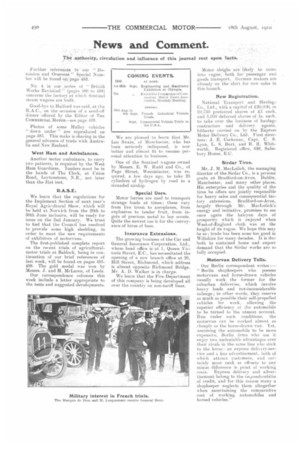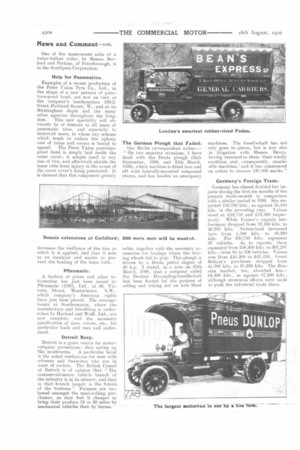News and Comment.
Page 8

Page 12

Page 13

If you've noticed an error in this article please click here to report it so we can fix it.
The authority, circulation and influence of this journal rest upon facts.
Further references to our " Dominion and Overseas " Special Number will be found on page 483.
No. 4 in our. series of " British Works Revisited '' (pages 486 to 488) concerns the factory at which Sentinel steam wagons are built.
Good-bye to Halford was said, at the R.A.C., on the occasion of a send-off dinner offered by the Editor of The COMMERCIAL MOTOR—see pnge 199.
Photos of some Halley vehicles " dawn under ". are reproduced on page 485. This make is sharing in the general advance of trade with Australia and New Zealand.
West Ham and Ambulances.
Another motor ambulance, to carry two patients, is required by the West Ham Guardians. Tenders most be in the hands of The Clerk, at Union Road, Leytonstone, N.E., not later than the 31st inst.
We learn that. the regulations for the Implement Section of next year's Royal Agricultural Show, which will be held at Norwich from the 26th to 30th June inclusive, will be ready for issue on the 2nd January. We trust to find that the Council has resolved to provide some high shedding, in order to meet the new requirements of exhibitors of motorvans.
The first-published complete report on the recent trials of agriculturalmotor trials at Baldock, being in continuation of our brief references of last week, will be found on pages 495498. The gold medal was won by Messrs. J. and H. McLaren, of Leeds. Our correspondence columns this week include a letter appropriate to the teats and suggested developments. We are pleased to learn that Mr. Leo Swain, of Manchester, who has been seriously indisposed, is now better and almost fit to resume personal attention to business.
One of the Sentinel wagons owned by Messrs. E. W. Rudd and Co., of Page Street, Westminster, was required, a few days ago, to take 25 cylinders of hydrogen by road to a stranded airship.
Special Uses.
Motor lorries are used to transport strange loads at times; these vary from live trout to aeroplanes, from explosives to tender fruit, from ingots of precious metal to boy scouts. Quite the newest use is for the conveyance of hives of bees.
Insurance Extensions.
The growing business of the Car and General Insurance Corporation, Ltd., whose head office is at 1, Queen Victoria Street, E.C., has necessitated the opening of a new branch office at 26, Hill Street, Richmond, which address is almost opposite Richmond Bridge. Mr. A. D. Walker is in charge.
We learn thatthe Fire Department of this company is being developed all over the country on non-tariff lines. Motor sleighs are likely to come into vogue, both for passenger and goods transport. German makers are already on the alert for new sales in this branch.
New Registration,
National Transport and Baulag:2 Co., Ltd., with a capital of £30,000, M 29,750 preferred shares of kl each, and 5,0110 deferred shares of is. each, to take over the business of haulage contractors and delivery agents, hitherto carried -on by the Expreas Motor Delivery Co., Ltd. First dirertors: J. E. Cochrane, Capt. C, S. Lyon, L. S. Burt, and R. R. Whitworth. Registered office, 638, Salisbury House, E.C.
Sirdar Tires.
Mr. J. M. MacLulich, the managing director of the Sirdar Co., is a persona grata at Bradford-on-Avon, Dublin, Manchester, and many other places. His enterprise and the quality of the tires he offers are jointly responsible for heavy sales and consequential factory extensions. Bradford-on-Avon, largely through Mr. MacIailich's energy and initiative, promises to see 0-nee again the halcyon days of prosperity which it enjoyed when West-of-England cloth was at the height of its vogue. We hope this may be so; trade has been none too good in Wiltshire for many decades. It is dua both to sustained home and export demand that the Sirdar works are so folly occupied.
Motorvan Delivery Tells.
Our Berlin correspondent writes:" Berlin shopkeepers who possess motorvans and horse-drawn vehicles usually work the former for the suburban deliveries, which involve heavy loads and not-inconsiderable mileage; in other words, they reserve us much as possible their self-propelled velikles for work, allowing the superior efficiency oi the automobile to be turned to the utmost account. Run under such conditions, the motorvan can be worked almost as cheaply as the horse-drawn van. Yet, assuming the automobile to be more expensive, Berlin firms who use it enjoy two undeniable advantages over their rivals in the same line who stick to the horse: an express delivcry-service and a fine advertisement, both of which attract customers, and certainly must rank as off-sets to any minus difference in point of working costs. Express delivery and advertisement belong to the in, ponderabilia of credit, and for this reason many a shopkeeper neglects them altogether when ascertaining the comparative cost of working automobiles and horsed vehicles."
One of the most-recent sales of a water-ballast roller, by Messrs. Barford and Perkins, of Peterborough, is to the Southport Corporation.
Help for Pneumatics.
Examples of a recent production of the Peter Union Tyre Co., Ltd., in the shape of a new pattern of puncture-proof band, are now on view at the company's headquarters 190-2, Great Portland Street, W., and at its Birmingham depot and the many other agencies throughout the king
dom. This new speciality will obviously be of interest to all users of pneumatic tires, and especially to motorcab users, to whom any scheme which tends to reduce the upkeep cost of tubes and covers is bound to appeal. The Peter Union punctureproof hand is simply laid inside the outer cover ; it adapts itself to any size of tire, and effectively shields the inner tube from injury in the event of the outer cover's being punctured. It is claimed that this component greatly
increases the resilience of the tire to which it is applied, and that it acts as an insulator and assists to prevent the heating of the inner tube.
Pneumatic.
A booklet of prices and other in formation has . just been issued by Pfleumatic (1910), Ltd., of 86, Victoria Street, Westminster, S.W., which company's American rights have just been placed. The arrangements at Southampton, where the manufacture and tire-filling is undertaken by Harland and Wolff. Ltd., are now complete, and the necessary specification of sizes, covers, etc., for particular loads and uses well understood.
Detroit Busy.
Detroit is a great centre for motor company promotions; they spring up like mushrooms. A particular hotel is the noted rendezvous for men with schemes and financiers who are in want of outlets. The British Consul at Detroit is of opinion that " The commercial-motor vehicle branch of the industry is in its infancy, and that in that branch largely is the future of the business." Farmers are reckoned amongst the most-willing purchasers, as they find it cheaper to bring their produce 18 or 20 miles by mechanical vehicles than by horses.
The German Plough that Failed.
Our Berlin correspondent writes :-" On two separate occasions, I have dealt with the Dents plough (24th September, 1908, and '25th March, 1909), which machine is fitted fore and aft with laterally-mounted compound shares, and has besides an emergency
cable, together with the necessary accessories for haulage where the driving wheels fail to grip. This plough is driven by a Dents petrol, engine of 40 h.p. I stated, in a note on 25th March, 1909, that a company called the Deutzer Motorpflug-Gesellschaft had been floated for the purpose of selling and letting out on hire :these machines. The Gesellschaft has not only gone to .pieces, but is now also in litigation with Messrs. Deutz, having returned to them 'their wholly worthless and, consequently, unsaleable machines,' and it has commenced an action to recover 137.000 marks."
Germany's Foreign Trade.
Germany has almost doubled her imports during the first six months of the present twelvemonth in comparison with a similar period in 1909. She imported 100,700 kilo., as against 56,400 kilo. in the preceding year. Values stood at £18,750 and £12,500 respectively. While France's exports into Germany dropped from 12,100 kilo. to
48,200 -kilo. Switzerland increased hers from 1,300 kiln. to 48,200 kilo. The 100,700 kilo. represent 37 vehicles. As to exports, these expanded from 248,300 kilo. to 301,20G kilo.—fiom 84 to 106 vehicles. Values rose from I:41,300 to 261,450_ Great Britain's purchases dropped from 41,500 kilo. to 31,200 kilo. The Russian market, too, absorbed less-64.300 kilo., as against 67,200 kilo., although strenuous efforts were ankle to push the industrial trade there.
"Commer-Car" Orders.
Apart front a cable order for 11 chassis for the U.S.A., Commercial Cars, Ltd., of London and Luton, has clone extremely well in its sales department this month. Of recent deliveries, those for Davenports C.13., Ltd., of Birmingham, and the Gas Light ;tad Coke Co., of London, may be mentioned; we illustrate the " Barnet-type" van for the latter buyer. NS hose fifth " Commer Car " it is, by whom lt is used bir the delivery., of meters, stores or _coke in sacks. A second vehicle is on 'order for Davenports.
Royalty's Baggage by Leyland Motorvan.
One of many good •results for the motor trade, wind' May be directly .ascribed to the last parade of the C.M.U.A. in conneetion with its annual prize-scheme for good driving, • is found in the decision • sto • which we have made several earlier references, of the Master of the Stables in the. Royal Household, Capt. the Hem W. C. W. Fitzwilliam, to adept motor transport—at least in part—for the conveyance of baggage. Capt. Fitzwilliam, in the course of conversation with the writer at the luncheon which preceded the parade, showed himself to be possessed of a " real grip " upon the essential points about motorvans, and we are not surprised to know that his choice fell upon a
Leyland vehicle. If from no other source, the testimony of Carter, Paterson and Co., Ltd., one of whose Leyland three-tonners was paraded ou the occasion mentioned, must have carried great weight. We are indebted to the Royal photographer at Balmoral for the photograph from which our illustration is reproduced.
























